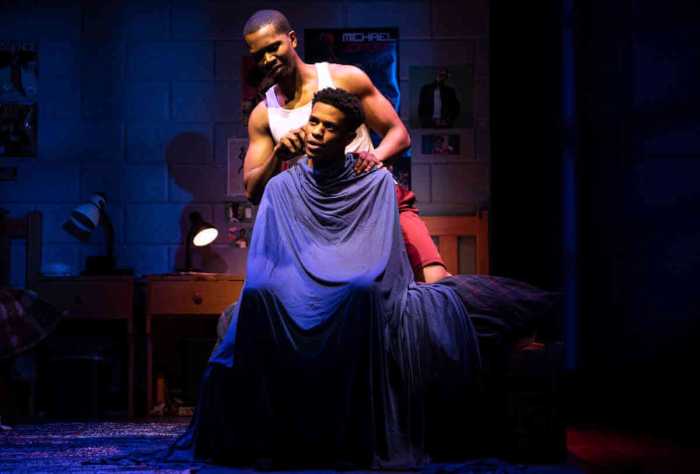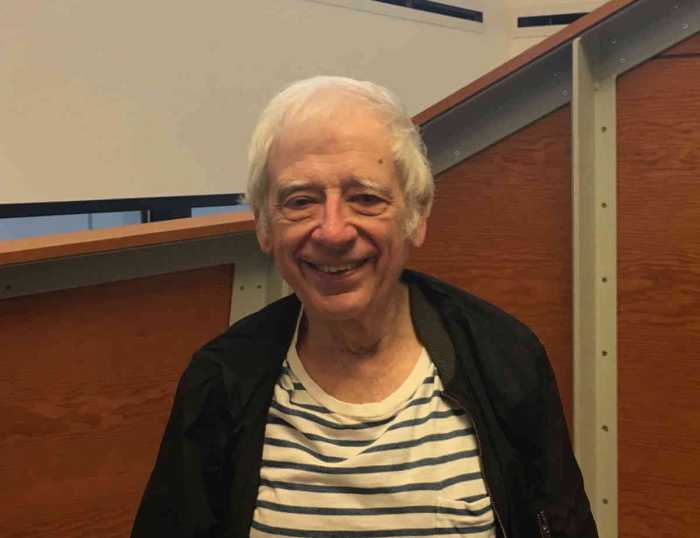Dominic Fumusa and Jessica Hecht in Sarah Ruhl’s “Stage Kiss.” | JOAN MARCUS
Sarah Ruhl’s “Stage Kiss” is an engaging blend of romantic comedy and farce that offers terrific performances by the two principals as well as the charming supporting cast. He and She, as they are identified, are actors who had an affair many years ago and have unexpectedly been cast as the romantic leads in the revival of a melodramatic 1930s play. Working together, they rekindle their romance and wreak all kinds of havoc on those around them.
The first act is all about mounting the play in New Haven and the way He and She move from frigid distance to overheated clinch. Playwright Ruhl is clearly in her element here, crafting the overwrought language from the dated script while plumbing the relationship among the characters in the here and now. The play is satirical, to be sure, but lovingly so, and we find ourselves delighting in the comedy as the really bad play within a play comes together. The first act ends with He and She back together again, it would seem.
To describe the second act would give away too many wonderful surprises and twists, but suffice it to say there is a significant change in tone that follows up the more madcap opening with a payoff in terms of a serious examination of how maturity changes romance. A bit of editing might have made the shift more subtly, but Ruhl delivers honesty and believability that is quite affecting.
Ruhl rules at Playwrights Horizons, while Shakespeare suffers at the Public
Jessica Hecht is wonderful as She. Always a highly detailed actor, she communicates so much with a look or a gesture, with seeming effortlessness, as a woman caught between the pull of her youthful passions and her current reality. Dominic Fumusa is equally outstanding as He, an actor who has a hard time negotiating a world that isn’t scripted. The supporting characters move fluidly between the world of the theater and their real lives, particularly Michael Cyril Creighton and Emma Galvin, who both play multiple roles.
This is thoughtful comedy for grown-ups about discovering what’s real and making choices.
Joaquina Kalukango and Jonathan Cake in “Antony and Cleopatra.” | JOAN MARCUS
The problems with the Public Theater’s new mounting of “Antony and Cleopatra” are evident from its first moments. Tarell Alvin McCraney’s cutting and rearranging of the text obscure plot and character more than they illuminate them — a particular problem when handling a Shakespeare play that is already among his most difficult. McCraney’s “Brother/ Sister Plays,” also produced by the Public, were powerful and unforgettable. But, here, the doomed romance between the Roman soldier and the Egyptian queen, transplanted, apparently, to the early 19th century Caribbean, proves as muddy as the Nile and as shallow as the pool that sits upstage on Tom Piper’s cheap-looking set.
The production opens with what is probably the play’s most famous speech, lifted from Act Two —“The barge she sat in was like a burnished throne…” Poetic as it is, it makes no sense before we have seen Cleopatra and understand the conflict between passion and politics that contributes to Antony’s undoing. This speech was originally written as a report to Caesar, who has not seen Cleopatra, about the threat her relationship with Antony poses to the empire. Obscuring its meaning undermines the emotional heft of the tragedy, and important exposition is shortchanged, which will likely confuse those not familiar with the play.
Jonathan Cake as Antony is an imposing presence, but his motivations are never specific, muddling his character. Sadly, Joaquina Kalukango is miscast as Cleopatra. She has none of the regal bearing of the queen and comes off as juvenile, superficial, and too contemporary. The only court this Cleopatra would be at home in is a food court. Her suicide feels more like the petulant act of a thwarted teenager than the act of a once-powerful queen who refuses to be debased by a conquering power.
Among the rest of the company only Chukwudi Iwuji as Enobarbus and Samuel Collings as Caesar have a grip on what they’re doing. The production suffers badly from a lack of basic speech technique on the part of much of the cast, often rendering the language unintelligible.
One leaves the theater wondering, “Who are these people?’ I’ve seen Cleopatra played as a skilled leader whose tragic flaw is love, as a vain vamp, and as the standard for an Egypt whose character is diametrically opposed to Rome’s rigidity, a contrast irresistible to the romantic Antony. I’ve also seen a production presented as an allegory representing, in Cleopatra’s story, the decline of political order. All of these were problematic –– “Antony and Cleopatra” is a problematic play. Still, what all those other productions had were focus and point of view, the lack of which is the undoing of the Public’s effort.
STAGE KISS | Playwrights Horizons, 416 W. 42nd St. | Through Apr. 6: Tue.-Wed. at 7 p.m.; Thu.-Sat. at 8 p.m.: Sat. at 2:30 p.m.; Sun at 7:30 p.m. | $75 at ticketcentral.com or 212-279-4200 | Two hrs., 15 min., with intermission
ANTONY AND CLEOPATRA | The Public Theater, 425 Lafayette St., btwn. E. Fourth St. & Astor Pl. | Through Mar. 23 | Tue.-Sun. at 8 p.m.; Sat. at 2 p.m. | $40-$74 at publictheater.org or 212-967-7555 | Two hrs., 45 min., with intermission




































